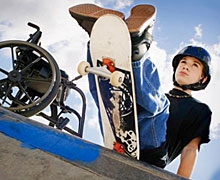Respecting Differences: How to Talk With Your Child About Disabilities

Your child's curiosity about others can be a chance to teach a respectful, inclusive attitude toward people who live with chronic illness or disability.
Children are naturally curious about others. When your child notices or asks questions about a person who has a disability or visible illness, it is an opportunity for you to talk about individual differences and respect. Your response will shape your child's future attitudes and actions toward people who live with ongoing health conditions or disabilities.
Here are some ideas:
Talking to preschoolers
- Give brief, direct answers to your child's inquiry. Avoid adding your interpretation of how the person feels about their disability. For example, when asked why someone is in a wheelchair, it's enough to simply say something like, "I guess she has trouble with her legs and can't walk."
- Let your child know that pointing and staring are not OK. Asking questions is fine. Depending on the situation, speaking directly with the person may be OK, too.
Talking to elementary school-age kids
- Your child may have a classmate with a disability. The child using a walker or cochlear implant may have plenty of things in common with your child. Encourage your child to see a potential friend, rather than focusing on differences.
- At this age, your child may be more aware of less-visible disabilities like those associated with learning or behavior. Answer your child's questions with facts, and be honest when you don't know the answer.
- Use "people first" language. It's more respectful to say that a person has a disability, rather than that a person is disabled. This way, the disability or illness is just one part of that person and not the defining feature.
We Are All "Different" in Some Way
We all find ways to adapt to our unique circumstances. Just as wearing glasses is a way to clear blurry vision, using a wheelchair is another way to get around if walking is a challenge. Approaching the concept of disabilities this way keeps the emphasis on ways we are similar, rather than on differences.
Teaching your child to be respectful and inclusive of all people involves coming to terms with your own feelings and perceptions first. If you haven't spent much time around people who live with chronic illness or disability, you may be unsure about how to act. You'll find links to good advice here on Seattlechildrens.org.
The bottom line is this: Treating others as you would like to be treated is still great advice.
